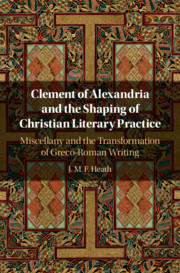 Clement of Alexandria and the Shaping of Christian Literary Practice
Clement of Alexandria and the Shaping of Christian Literary Practice Published online by Cambridge University Press: 16 December 2020
Pliny, Gellius, Plutarch, and Athenaeus each give a religious frame to their miscellanies, and the most consistently cited deities are the Muses. This is no empty rhetorical convention but an attempt to connect their work to a tradition where the Muses preside over revelation of things hidden. Different strands of the Muse tradition are taken up, including revelation to the studious, solitary lucubrator and philosophical revelation where philosophy is the highest form of mousikê. The miscellanists develop forms of social and ascetic discipline to participate more deeply in the spirituality of this tradition, by refraining from sleep, food, or certain kinds of talk and by practising their labours by night or alone. Clement shows his intention to respond to this Classical tradition by framing his project in Christian paideia with allusions to the Classical tradition of mousikê. But he displaces Apollo (Muse-leader) with Christ, the bee (symbol of the Muses) with the Christ-Logos and either omits or debunks the Muses at every opportunity.
To save this book to your Kindle, first ensure no-reply@cambridge.org is added to your Approved Personal Document E-mail List under your Personal Document Settings on the Manage Your Content and Devices page of your Amazon account. Then enter the ‘name’ part of your Kindle email address below. Find out more about saving to your Kindle.
Note you can select to save to either the @free.kindle.com or @kindle.com variations. ‘@free.kindle.com’ emails are free but can only be saved to your device when it is connected to wi-fi. ‘@kindle.com’ emails can be delivered even when you are not connected to wi-fi, but note that service fees apply.
Find out more about the Kindle Personal Document Service.
To save content items to your account, please confirm that you agree to abide by our usage policies. If this is the first time you use this feature, you will be asked to authorise Cambridge Core to connect with your account. Find out more about saving content to Dropbox.
To save content items to your account, please confirm that you agree to abide by our usage policies. If this is the first time you use this feature, you will be asked to authorise Cambridge Core to connect with your account. Find out more about saving content to Google Drive.